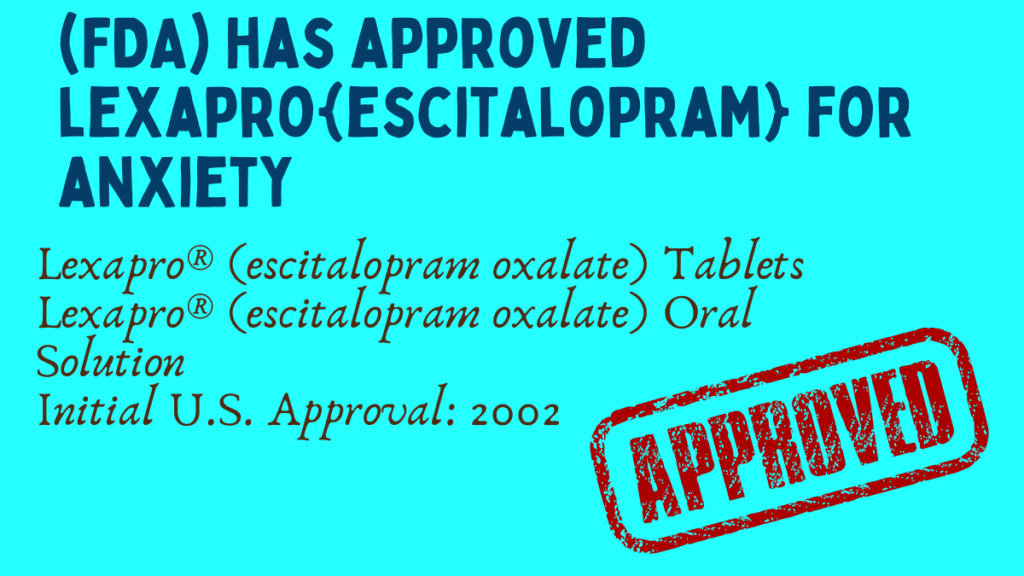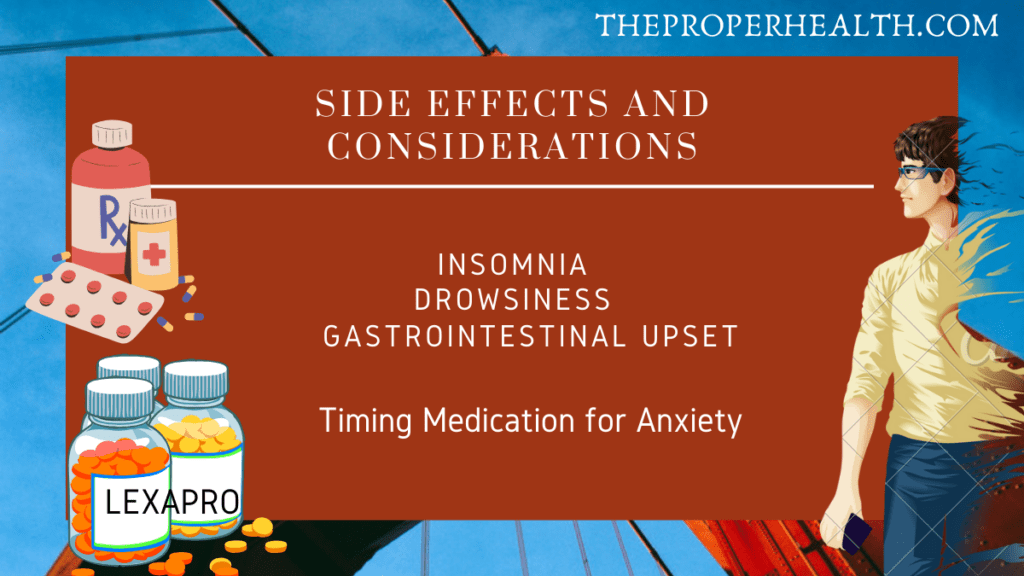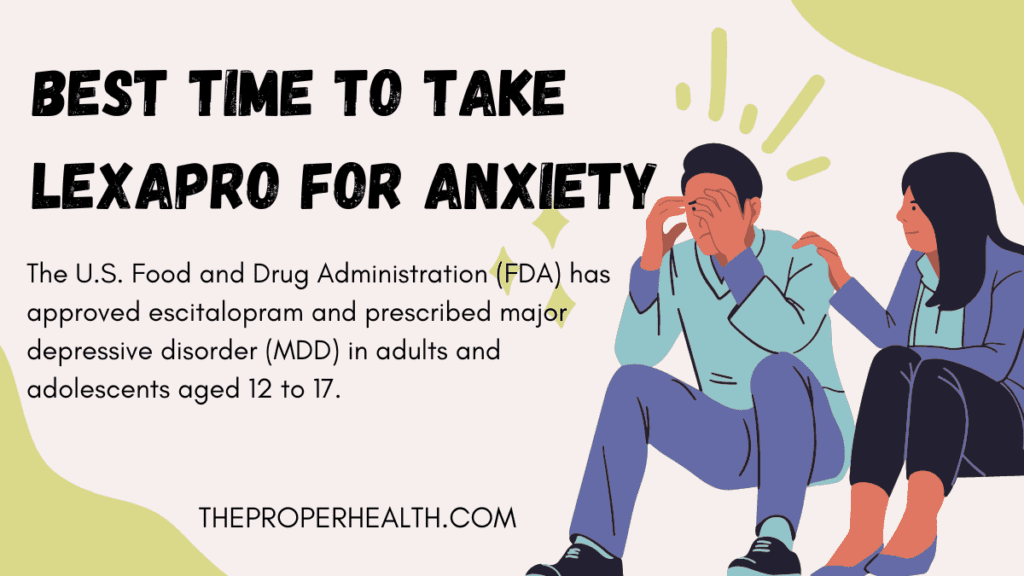Lexapro, also known as escitalopram, s a highly selective serotonin reuptake inhibitor Selective serotonin reuptake inhibitors (SSRIs) are a widely used type of antidepressant·
The U·S· Food and Drug Administration (FDA) has approved escitalopram and prescribed major depressive disorder (MDD) in adults and adolescents aged 12 to 17·

WARNING: Suicidality and Antidepressant Drugs See full prescribing information for complete boxed warning.
Increased risk of suicidal thinking and behavior in children, adolescents and young adults taking antidepressants for major depressive disorder (MDD) and other psychiatric disorders. Lexapro is not approved for use in pediatric patients less than 12 years of age.
Doctors also Recommends Lexapro (escitalopram) to deal with panic disorder, post-traumatic stress disorder (PTSD), and obsessive-compulsive disorder (OCD)
and various mental health conditions, including anxiety disorders, depression, and certain mood disorders·
“Escitalopram works by increasing serotonin levels in the brain. Serotonin is a chemical that carries messages between nerve cells in the brain and throughout your body that helps control mood, emotions, and anxiety.”
Lexapro helps with anxiety by keeping more happy chemicals called [serotonin] in your brain.
When you’re anxious, your brain might not have enough of these chemicals. Lexapro stops them from leaving too quickly, so there’s more around to help you feel better.
Disorders Treated by Lexapro
Lexapro is often prescribed for:
The anxiety disorders for which Lexapro is often prescribed include:
- Generalized Anxiety Disorder (GAD): Characterized by excessive worry and anxiety about various aspects of life, often without a specific trigger.
- Panic Disorder: Marked by recurring panic attacks accompanied by intense fear or discomfort, often manifesting with physical symptoms such as rapid heartbeat, sweating, and trembling.
- Social Anxiety Disorder (Social Phobia): Involves intense fear or anxiety about social situations, interactions, or performance, leading to avoidance behaviors.
- Obsessive-Compulsive Disorder (OCD): Characterized by recurring, intrusive thoughts (obsessions) and repetitive behaviors or mental acts (compulsions) aimed at reducing anxiety.
LEXAPRO DOSAGE AND ADMINISTRATION
Lexapro is typically administered orally, once daily, morning or evening with or without food
Dosage may vary depending on symptom severity and individual response to the medication.
Adhering to the prescribed dosage instructions is crucial, even if symptoms improve.
As with any medication, Lexapro may entail side effects, which can differ among individuals.
Lexapro® (escitalopram oxalate) Tablets
Lexapro® (escitalopram oxalate) Oral Solution
Initial U.S. Approval: 2002
| Indication | Recommended Dose |
| Major depressive disorder (MDD] | |
| ADOLESCENCES | Initially 10 mg once daily OR max to max 20 mg once daily |
| ADULTS | Initially10 mg once daily OR max to max 20 mg once daily |
| Generalized Anxiety Disorder (GAD) | |
| ADULTS | Initially 10 mg once daily OR max to max 20 mg once daily |
No additional benefits have been observed with a dosage of 20 mg/day.
For most elderly patients and those with hepatic impairment, the recommended dose is 10 mg/day.
If your kidneys are only a little or moderately not working well, you don’t need to change your medicine dose. But if your kidneys are severely not working well, you should be really careful with your medicine.
Commonly prescribed strengths of Lexapro tablets include:
- 5 mg tablets: These lower-dose tablets may be prescribed initially, especially for individuals who are more sensitive to medications or who have mild anxiety symptoms.
- 10 mg tablets: This is the standard starting dose for most adults.
- 20 mg tablets: Some individuals may require higher doses for optimal symptom relief. However, doses above 20 mg per day are not usually recommended due to the increased risk of side effects without necessarily providing additional benefits.

Side Effects and Considerations
Common side effects include nausea, dizziness, headache, insomnia, and sexual dysfunction. It’s essential to report any unusual or severe side effects to a healthcare provider·
Lexapro is often regarded as an effective and well-tolerated treatment option for anxiety disorders, though its efficacy can vary among individuals·
It may take several weeks for the full therapeutic effects to manifest, emphasizing the importance of patience and consistent use·
Side Effects and Timing:
Lexapro may cause side effects, and the timing of when it’s taken may influence their severity:
- Insomnia: Taking Lexapro in the morning may help mitigate insomnia for some individuals, while others may find evening dosing more effective.
- Drowsiness: Evening dosing may be preferable for individuals experiencing drowsiness or fatigue as a side effect.
- Gastrointestinal Upset: Taking Lexapro with food or splitting the dose between morning and evening may help alleviate gastrointestinal side effects.
Timing Medication for Anxiety
Timing medication for anxiety is crucial for several reasons:
- Optimizing Symptom Control: Proper timing ensures optimal symptom management throughout the day, aligning with peak anxiety periods or triggering situations.
- Minimizing Side Effects: Appropriate timing helps reduce the occurrence and severity of side effects. For instance, taking medication with food may alleviate gastrointestinal discomfort, while bedtime dosing can mitigate daytime drowsiness.
- Enhancing Adherence: Consistent dosing schedules improve medication adherence, facilitating incorporation into daily routines and promoting better long-term symptom management.
- Addressing Circadian Rhythms: Timely medication intake aligns with the body’s natural rhythms, potentially enhancing therapeutic effects and overall well-being.
- Maximizing Treatment Effectiveness: Tailoring medication timing to individual factors such as metabolism and lifestyle can optimize treatment outcomes and response to therapy.
- Minimizing Drug Interactions: Proper timing reduces the risk of drug interactions, ensuring safe and effective treatment.

Here’s how Lexapro works in the body to alleviate anxiety symptoms
- Serotonin Regulation: Serotonin is a neurotransmitter that helps regulate mood, emotions, and anxiety. People with anxiety disorders often have imbalances in serotonin levels. Lexapro blocks the reuptake of serotonin, which means it increases the levels of serotonin available in the brain. This helps improve mood and reduce anxiety symptoms.
- Neurotransmitter Communication: By increasing serotonin levels, Lexapro enhances communication between nerve cells in the brain. This improved communication is believed to alleviate symptoms of anxiety by promoting feelings of calmness and reducing excessive worry or fear.
- Neuroplasticity: Chronic anxiety can affect the structure and function of the brain. SSRIs like Lexapro have been found to promote neuroplasticity, which is the brain’s ability to reorganize and form new neural connections. By enhancing neuroplasticity, Lexapro may help the brain adapt to reduce anxiety symptoms over time.
It’s important to take Lexapro exactly as prescribed by your healthcare provider and to follow their instructions regarding dosage adjustments·
It may take several weeks of consistent use for you to experience the full benefits of Lexapro, so be patient and continue taking it as directed·
Additionally, never stop taking Lexapro abruptly without consulting your doctor, as this can lead to withdrawal symptoms and potential worsening of anxiety
Factors to Consider When deciding on the best time to take Lexapro
When deciding on the best time to take Lexapro, consider the following factors:
- Metabolism: Individuals with faster metabolism may prefer morning dosing to reduce the risk of insomnia, while those with slower metabolism may benefit from evening dosing for sustained medication levels throughout the night.
- Lifestyle: Consider your work schedule, daily routine, and other medications or supplements being taken. Evening dosing may be preferable for individuals experiencing drowsiness as a side effect.
- Personal Preference: Choose a time that fits into your daily routine and aligns with your preferences to ensure consistent adherence to the medication regimen.
Morning vs. Evening Dosing
Morning Dosing Experiences:
Pros:
- “I’ve been taking Lexapro in the morning for several months now, and it has really helped me manage my anxiety throughout the day. I feel more alert and focused, and I haven’t experienced any trouble sleeping since starting the medication.” – Sarah
- “Taking Lexapro in the morning fits well into my routine. I just take it with breakfast, and I’m good to go for the day. I’ve noticed a significant reduction in my anxiety symptoms without any major side effects.” – John
Cons:
- “I started Lexapro in the morning, but I found that it made me feel a bit nauseous and dizzy during the day, especially right after taking it. I switched to evening dosing, and those side effects went away.” – Emily
- “Morning dosing was fine at first, but I noticed that I was feeling more anxious in the mornings, and it took a while for the medication to kick in. My doctor suggested switching to evening dosing, and that seemed to help.” – Michael
Evening Dosing Experiences:
Pros:
- “Taking Lexapro in the evening has been a game-changer for me. I used to have trouble falling asleep due to anxiety, but now I feel much more relaxed at night, and my sleep has improved significantly.” – Laura
- “I prefer evening dosing because it allows me to sleep through any initial side effects, like drowsiness or fatigue. Plus, it helps me wind down after a busy day and makes me feel more at ease.” – David
Cons:
- “I tried taking Lexapro in the evening, but I found that it made me feel too groggy in the morning. I switched to morning dosing, and that seemed to work better for me.” – Alex
- “Evening dosing worked well for a while, but I started experiencing vivid dreams and restless sleep. I switched back to morning dosing, and those issues went away.” – Jessica
Conclusion
In conclusion, Lexapro (escitalopram) stands as a prominent treatment option for a spectrum of anxiety disorders, offering relief by modulating serotonin levels in the brain· Its efficacy in addressing conditions like generalized anxiety disorder, panic disorder, social anxiety disorder, and obsessive-compulsive disorder underscores its versatility and clinical significance·
When considering the administration of Lexapro, adherence to prescribed dosages and timing is paramount for optimal therapeutic outcomes. While initial dosages typically start at 10 mg daily for most adults, individual response and symptom severity may necessitate adjustments.
Additionally, mindful consideration of side effects, such as nausea, dizziness, and insomnia, can guide timing preferences, whether morning or evening dosing.
Ultimately, the decision regarding the timing of Lexapro intake should be tailored to individual needs and lifestyle factors, with close collaboration between patients and healthcare providers to ensure comprehensive management of anxiety symptoms while minimizing adverse effects.
